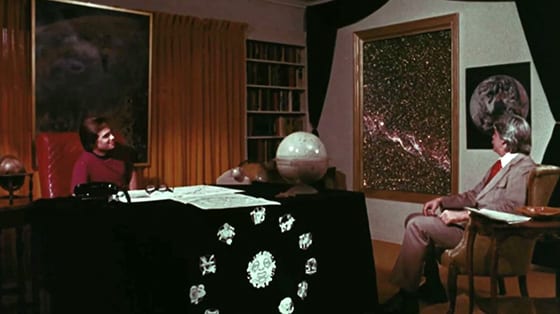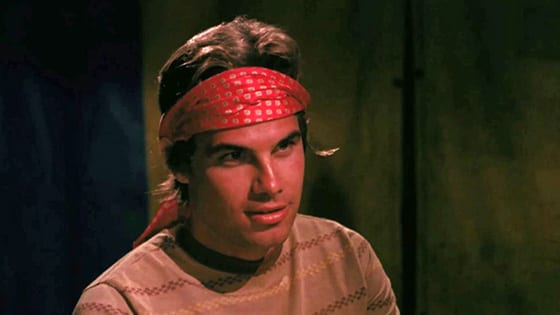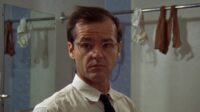In a reversal of this practical parable’s usual cadence, one man’s treasure is another man’s trash. This is where the tastes, descriptions, and comparisons begin for 1976’s The Astrologer. A young man named Craig Denney set out to direct and star in his own feature film to break into stardom. It was a passion project of sorts derailed by a backstory of avoidable failure. Along the same lines as trash versus treasure, one filmmaker’s passion project is another man’s vanity film.
Reclaimed by underground cinephiles and restored by the American Genre Film Archive, the forgotten flop has become an especially rare cult not-so-classic. A trainwreck of a treat to behold, The Astrologer is the kind of movie that makes appearances at midnight film festivals at speakeasy-level little indie movie venues. This one is a rare niche. You can’t search for it streaming on JustWatch. If you ever find it, give it a guilty pleasure watch. The best taste I can give you is an edited trailer on YouTube:
https://www.youtube.com/watch?v=dQZdQzu7LpA
A prime offender of “outsider cinema” and rudderless with its dalliances written by Dorothy June Pidgeon, The Astrologer takes viewers all over two globes, the one we live on and the one that sits on your shoulders and holds your brain, without a narrative map in sight. Taking its own approach to the rags-to-riches tropes of the American Dream, the film chronicles Denney playing Craig Marcus Alexander, a former teen dreamer, and thief who now steals with a straight face as a sideshow performer for a carnival tourist trap in Long Beach, California. Calling himself “Alexander the Great” and advertised by his bardic right-hand man Arthyr (Arthyr Chadbourne, himself an astrologer and consultant on the film), Alexander lobbies his high interest in the occult into embodying a not-so-mysterious mystic.

To get the gobbledygook of this folly, you’re going to need to know your astrology lingo. If you are like this writer and don’t peruse daily horoscopes of digital or print periodicals, you’re going to be buried under multiple-meaning terms like “conjunct,” “transit,” “natal,” “sidereal,” and “tropical.“ Bone up on that vocabulary. If it won’t matter, enjoy your inner giggles when the “lunar returns” eventually become “angular to Uranus.”
Denney leaves the carny life for an adventure to build his fortune. Hopping from Allan Quatermain-level hijinks of snakes and jungle dangers in Kenya to the seedy expatriate bars after sailing on the lam to Tahiti, Alexander makes off with jewels that he fences and invests into the first $2 million of his business play to create his astrology empire back in California. In a meta movie-within-the-movie moment, the self-financed big-screen film Alexander puts out about his so-called powers and tall-tale exploits becomes a $145 million box office smash, cementing his ambition and opening the opportunities to become a celebrity figure and renowned public authority on all matters of horoscope.
All of this silliness could have been yours in 1975 had Denney and the film’s producers properly secured the rights to the playlist of Moody Blues songs used throughout The Astrologer. Instead, it never received an official release and became a victim to obscurity. Missing out on glamour, this stands as Denney’s (and many others involved) sole credit on IMDb as a director and actor. When you see Craig’s flatlining blandness in every expression and line reading, you will see why this was it. He leads quite the display of simplistic and elementary acting, all of which were still committed though, in their own way, to make a Hollywood movie.

What happens to Alexander mirrors Craig Denney making the film to play the character. He’s a pretender ascending to a point where he can no longer pretend. A far parallel to Charles Foster Kane, Alexander wants a large status and audience by means of deceit and shortcuts that catch up to him. As fate would have it, the same happens to Denney behind the camera only he tricked himself into thinking The Astrologer would lead to immediate industry success. The film’s failure to even make it to release, let alone stardom, means Denney never made it past pretender. He had it worse than his own character.
The acting might be nails on the chalkboard and the storyline tangents might kill a few brain cells, but the picture isn’t a complete chore. The ordeal mind just bring out fondness like an unearthed time capsule with more treasure than trash. Any amateur-ish film with the balls to cite King Lear in the closing credits creates enough curiosity to observe the creative hubris at work.
Honestly, compared to something similar from the modern era like Tommy Wiseau’s The Room, The Astrologer actually boasts resourceful production value in several departments for a film of this era and scale. Improper or not (the copyright violation sunk the film), the Moody Blues tunes of “Nights in White Satin” and “Tuesday Afternoon” create quite the heady vibe for the film. Opening on a flyby of the bright lights of the carnival attractions below backed by an opening narration and adapted orchestral music that borrows from the “Astrologer” theme of Gustav Holst’s Planets suite, production designer Kurt Grunert and cinematographer Alan Gormick, Jr. (a long-time underwater camera expert lensing what would be his only full feature) crafted and shot the heck of what they had to work with.
The opening is just the beginning of a frequently moving assembly line of fixes employed by veteran TV editor Chuck Gladden. There is an overuse of extended sequences constructed almost entirely of establishing shots, montages, second unit-level footage, scene transitions, and voiceovers. A stopwatch might find that 50% of The Astrologer is hilariously built this way. Those stretches are odd yet effective in that they thankfully give the film a better-than-satisfactory pace to account for the random passage of time and likely also cover badly-voiced dialogue in the scenes underneath.
Simply put, charm can be found in the inexplicable such as The Astrologer. There is something to be said for watching something familiar yet fluky. As random and stupefying as it is, there is a thirsty arc here of a big picture. The Astrologer is an inviting presentation that warrants guilty pleasure enjoyment as a trashy treat earning your cringing smirks and amused facepalms.




